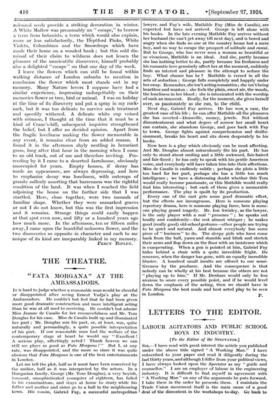THE THEATRE.
" FATA MORGANA" AT THE AMBASSADORS.
IT is hard to judge whether a reasonable man would be cheerful or disappointed after seeing Ernest Vadja's play at the Ambassadors. He couldn't but feel that he had been given more good dramatic construction and more intelligent acting than he was at all used to receiving. He couldn't but admire Miss Jeanne de Casalis for her resourcefulness and Mr. Tom .Douglas for his ease. Miss de Casalis built up and illuminated -her part ; Mr. Douglas was his part, or, at least, was, quite naturally and persuadingly, a quite possible interpretation of his part. If our reasonable man had the welfare of the contemporary stage at heart he would say " Excellent ! A serious play, affectingly acted ! Thank heaven we can still see plays as good as Fata Morgana ! " But I, at any -rate, was disappointed, and the more so since it was quite obvious that Fata Morgana is one of the best entertainments in London.
Let me tell the plot, half as it must have been conceived by the author, half as it was interpreted by the actors. In a Hungarian family, George (Mr. Tom Douglas), a very boyish, innocent, unsophisticated youngster of eighteen, has failed in his examinations, and stays at home to study while his father and mother and sister go to a ball in the neighbouring town. His cousin, Gabriel Fay, a successful metropolitan lawyer, and Fay's wife, Mathilde Fay (Miss de Casalis), are expected but have not arrived. George is left alone with his books. In the late evening Mathilde Fay arrives without her husband (he can't get away till next day), and is bored and angry when she finds no one at the country house but a mere boy, and no way to escape the prospect of solitude and ennui. But to George, who has never seen a woman so beautiful or so vivacious, Mathilde is an ideal. And she, partly because she has. 'nothing better to do; partly because his freshness and his romantic love genuinely affect her at the moment, suddenly finds an interest and pleasure in the attempt to seduce the boy. What chance has he ? Mathilde is versed in all the arts of seduction ; George falls completely and happily under her sway. Remember, she isn't acting romantics ; she isn't being heartless and wanton ; she feels the plain, met air, the woods, the loneliness in her blood ; she is intoxicated with the worship of such an innocent. Really, for the moment, she gives herself
over, as passionately as she can, to the child.
Next day, Gabriel Fay arrives. He has won a case, the greatest case of his life ; he can offer Mathilde all the pleasures she has coveted—Deauville, money, jewels. Not without discontentment and what degree of sorrow her small heart can contain, she abandons George, and goes back with Fay to town. George fights against comprehension and disillu- sionment, breaks his heart and sits down desperately to his books.
Now here is a play which obviously can be most affecting. And Mr. Douglas almost miraculously fits his part. He has only to stand about smiling and a little awkward, fair-haired and fair-faced ; he has only to speak with his gentle American voice, and everybody will have taken him into their affections. Miss de Casalis is endlessly subtle ; perhaps she plots a little too hard for her part, perhaps she has a little too much intelligence ; we have a distressing doubt whether this Tom would really become passionate, or this Mathilde would really find him interesting ; but each of them gives a memorable performance. The play is spoilt by its production.
Every one of the cast gets some good dramatic effect, but the effects are incongruous. Here is someone playing repertory drama, here is someone playing farce, here is some- one playing grand tragedy. Mr. Ion Swinley, as the lawyer, is the only player with a real " presence " ; he speaks out loudly and confidently—the rest almost whisper ; he makes good (really good) old-school gestures—other people are trying to be quiet and natural. And almost everybody has some piece of " business" to do. The sleepy girls who have come back from the ball, yawn and stumble and blink and stretch their arms and flop down on the floor with an insistence which is exasperating. When a gun is pointed at him, Gabriel Fay hides behind a chair with a quite incredible fright. Be recovers, when the danger has gone, with an equally incredible bluster. A hundred small insults are offered to our sensi- tiveness by the producer. And the consequence is that nobody can be wholly at his best because the others are not " playing up to him." If Mr. Denham would only be less anxious to score every possible point, and if he would level down the emphasis of the acting, then we should have in Fata Morgana the best made and best acted play to be seen






































 Previous page
Previous page